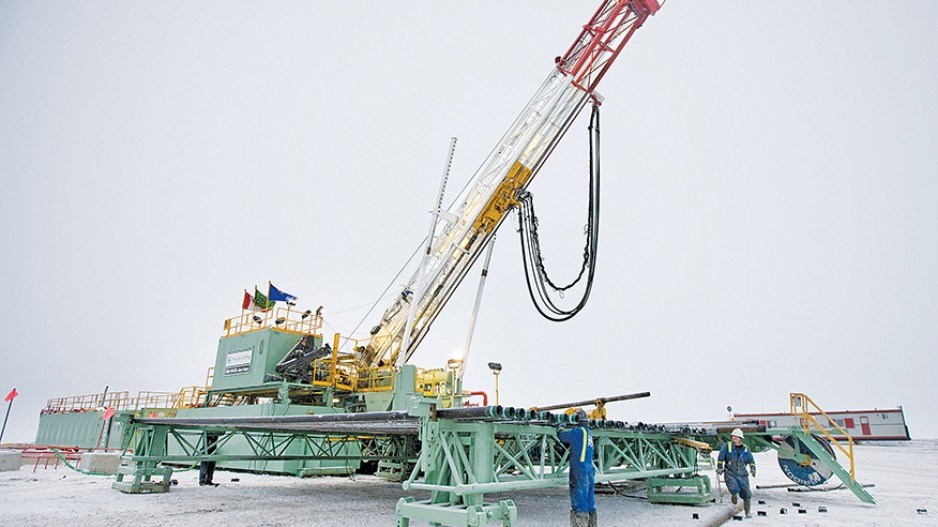An ominous cloud may have been cast over the multi-billion-dollar liquefied natural gas (LNG) industry in northeast B.C., but local residents say the resource horizon remains bright.
After the August announcement that Malaysia-based Petronas would be pulling the plug on its $36 billion Pacific NorthWest LNG project, many locals are echoing the same sentiment: the project had been overhyped and, on the ground, things are busier than ever.
“In the north, where the gas is being drilled and produced and primary processing is taking place, we are seeing an upsurge in activity related to pipeline expansion.… There is a lot of work going on,” said Bob Fedderly, northeast businessman and owner of Fedderly Transportation Ltd.
“A lot of people that are working in the industry hadn’t bet their last dollar on [the project] going ahead because it wasn’t a sure thing.”
Petronas will continue to develop holdings in the Montney region and will work with B.C.’s new NDP government to continue to foster its natural gas assets in northeast B.C. The assets were gained in 2013 when Petronas acquired Alberta’s Progress Energy Resources for $5 billion.
Petronas currently has the second-largest position in B.C.’s Montney formation. The company estimates its potential natural gas reserves nearing 52 trillion cubic feet.
Real estate
Mitch Collins, investment realtor in the northeast, admits that although the real estate market is slow in Fort St. John, it is the product of a prevailing trend and should not be reflective of what is happening with the LNG industry.
“From a sales standpoint the market has been slow in Fort St. John for the last couple years,” said Collins. “Right now there are more listings on the market than we’ve historically ever had, so we are pretty much at an all-time high for listings.”
He is quick to point out that, while sales remain low, activity in the area continues to be high.
“The oil and gas market is having a lot of work happening with pipelines and drilling. Gas plants are being built. There are some capital upgrades going on between pulp mills just outside of Fort St. John,” he said.
Nevertheless, the confusion brought about by industry trends and political volatility has inspired skepticism in the market, according to Collins.
“From a sales side people are opting to rent at the moment until some of the political uncertainty has dissipated. Nobody really expected an NDP-Green coalition to take power, and now that it has, the threat of them shutting down Site C is weighing on everyone’s mind.”
The Site C dam project is currently under review and has spurred criticism because of estimated project costs going far over budget.
In Dawson Creek, the sentiments of high activity levels are the same.
“Dawson Creek is sitting on a less than 1% [residential] vacancy right now. There is no place to stay in Dawson Creek,” Collins explained.
“Our community is very busy,” said Dale Bumstead, mayor of Dawson Creek. “There are lots of projects going on like infrastructure builds for processing plants and pipeline. There is a huge amount of construction feeding the natural gas [sector].”
Pipelines
As for other projects in the area, Bumstead cites the Towerbirch expansion project as just one example of ongoing employment that shows the continued interests of various big-name players in the oil and gas industry.
“[The pipeline] being built by TransCanada has an additional three processing plants that are under construction worth $2.5 billion in capital infrastructure costs. They will be built and online early 2018.”
Bumstead said that companies like Arc Resources Ltd., Tourmaline Oil Corp., Crew Energy Inc. and Encana Corp. have all ramped up production.
“I think what we need to start shifting toward is getting the gas out through Washington state and looking to that direction,” said Bob Zimmer, MP for Prince George-Peace River-Northern Rockies.
The biggest issue in British Columbia, according to Zimmer, is a faltering reputation.
“The biggest concern for me is that it is not setting a climate of confidence in B.C. for the resource developers – that’s what I am more concerned about,” he said.
“It is already a tough race, regulatory-wise, to establish resource developmental projects, and this just gives [developers] one more reason not to come to B.C.”




